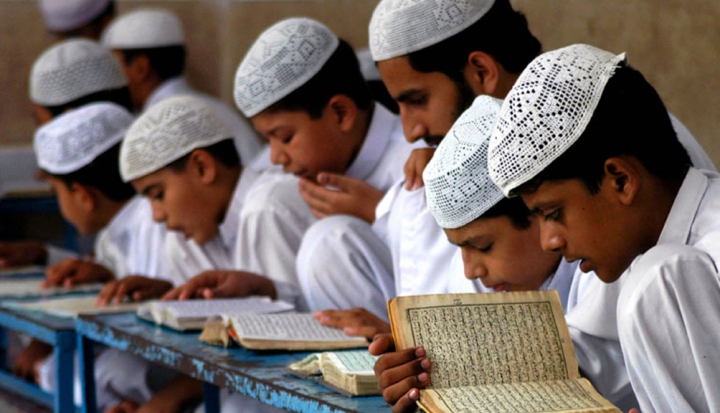It’s now been almost a year since Pope Francis issued his apostolic exhortation “The Joy of the Gospel.” Much has been written about this long document; its approach to evangelization, social justice, and a more decentralized church has been variously dissected, praised, and panned. Still, there is one blockbuster sentence that most seem to have missed: “Faced with disconcerting episodes of violent fundamentalism, our respect for true followers of Islam should lead us to avoid hateful generalizations, for authentic Islam and the proper reading of the Quran are opposed to every form of violence.”
Since it is tucked inside paragraph #253―one calling for religious freedom for Christians in Muslim countries―readers can be forgiven for overlooking it. But why is this line significant? And now that ISIS has advanced into Iraq, why might the sentence deserve attention?
While it’s noteworthy that the pope speaks favorably about Islam, it is hardly unprecedented for a pope to do so. In the mid-60s, Paul VI promulgated the Second Vatican Council’s list of tenets of Islam with which the church clearly agrees―for instance, the Creator God and final judgment―and its inclusion of Muslims in God’s plan of salvation. Benedict XVI, for all his missteps with the Islamic community, noted that Christians and Muslims should be natural allies in the push-back against atheism and the secularization of the West. And St. John Paul II, as Francis does in the first part of the sentence, rejected the popular expressions “Islamic fundamentalism” and “Islamic terrorism” in favor of the generic terms “religious fundamentalism” and “terrorism.”
What stands out to me is that last part of the sentence, the part that supplies the rest with its justifying force: “for authentic Islam and the proper reading of the Quran are opposed to every form of violence.” There are three things about this proposition that deserve our attention. The first has to do with what must have been the case for Francis to make this claim in the first place. Francis not only must have read the Quran, but also must have been conversant with alternative interpretations of Quranic texts and adjudicated among them to achieve “the proper reading.” Here, Francis joins John Paul II’s religion-neutral condemnations of terrorism to the quite specific and exculpatory claim about Islam and, more specific still, about the Quran itself. One can hardly imagine past popes engaging Islam in this depth.
Critics might argue that this substantive interaction with Islam is the problem with the sentence, not its virtue. Since the teaching authority of the church extends only to Christian “faith and morals,” Francis has no business pronouncing on the nature of other religions, and his statement is merely (inappropriate) opinion. A more nuanced view recognizes that an apostolic exhortation does not rise to the level of a papal encyclical but remains part of the ordinary papal magisterium. In a pluralistic age of interreligious encounter, a pope has a responsibility to show that a truly “catholic” (i.e., universal and broad-minded) religion must clarify that its relationship with Islam is grounded in a deep orientation to peace that Islam can recognize from its own sources.
The second, and related, point concerning Francis’ overlooked sentence is that with it, Francis unequivocally undercuts the position or assumption of millions of Catholics and other Christians that the Quran and Islam―whatever one might say about the goodness of particular Muslims―are intrinsically violent and therefore evil and unreformable. Francis makes his assertion rather than arguing for it, but in doing so makes clear the reason why the “hateful generalizations” have no foundation. Vatican II did not teach that each and every element of other religions is by definition good and holy; but to have the Catholic Church now unambiguously affirm, through the voice of the pope, that violence is in no way one of those bad or compromising elements when it comes to Islam, properly understood, goes to the heart of the matter.
In the West, many Christians have learned through friendship and inter-religious dialogue that “good Muslims” are not accidents; they are not good and holy in spite of their religion and its scriptures, but in response to them. What Francis said confirms what Christians have already experienced, but such confirmation from the top is important. To my knowledge, no previous pope has made this explicit. The claim that Islam and the Quran are, at root, violent and corrupt can no longer be made with official Catholic support. And some conservative Christians might begin to understand that a political Islam is not the way Islam must exist.
Thirdly, Francis’ statement strengthens the prospects for inter-religious dialogue with Muslims and the shared work for justice and peace. In our climate, to indicate to Catholics that peace is foundational to Islam and its sources expresses respect for Islam and allows Muslims to see themselves and their religion as more accurately represented by Catholicism than before. Looking ahead, Muslims should continue to stand up against violent words and deeds of those who make false claims about the Quran, and Catholics need to be consistent in their peacemaking and in explaining the pope’s words to Catholics and other Christians. Absent those explanations, Francis’ “overlooked sentence,” once noticed, will be seen by many as simply a nod to political correctness.
Some will say that there is, in fact, violence in the Quran, and they will be right. There is some bellicose language in the text, and instances or conditions that justify recourse to violence; namely, defense against aggression and resistance to grave oppression. Yet much the same thing can be said about the Bible and just war theory in Catholic social teaching, even though the non-violence of Jesus in the New Testament is unconditional. Neither the Quran nor the Bible can be understood without appreciating the historical context within which its particular texts came to be.
Recently, Francis preached in a homily that “faith and violence are incompatible,” but it is also customary for popes to speak of defensive war as a potentially legitimate “use of force,” as they put it. The point is that Francis’ admittedly imprecise language on Islam―its being “opposed to every form of violence”―cannot be used to ignore the thrust of it, which is that the Qur’an cannot be used as a tool of unjust killing (i.e., “violence” in the evaluative sense of the word), even if unjust killing is present in the history of Islam (and Christianity). Francis’ choice of words might also reflect a paranetic, inspirational style of speech proper to an exhortation.
Others will say that when Francis speaks of “true followers” of Islam and “authentic Islam,” he implicitly gives counterfeit followers and counterfeit Islam undeserved attention and, what’s more, a status within Islam it does not deserve. I appreciate the dilemma. And from the perspective of Muslims, the pope’s sentence is hardly “news” to them. But if militant groups and jihadists such as ISIS make false claims about Islam, how else to deny them that legitimacy than by calling them “false” and “inauthentic,” as many Muslims themselves have done? To my mind, an “inauthentic Catholicism” could not be equated with or identified with “Catholicism,” but it would have to be reckoned with.
The danger of exaggerating the implications of “one sentence” is as real as overlooking them. Still, in saying what a proper reading of Islam and the Quran is opposed to, Francis is doing more than it appears. The Catholic Church is no longer sidestepping an important issue, whether the Quran is intrinsically violent. When the pope affirms for us on an official level that peace building, not violence, is integral to what Islam is as a religion (as it is for us), the way forward becomes clearer.
This is a web-only essay.
Image: Flickr photo cc by Rizwan Sagar 03458650886













Add comment